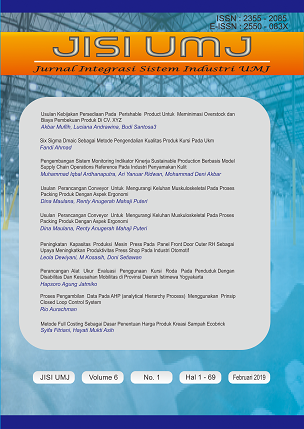PENGEMBANGAN SISTEM MONITORING INDIKATOR KINERJA SUSTAINABLE PRODUCTION BERBASIS MODEL SUPPLY CHAIN OPERATIONS REFERENCE PADA INDUSTRI PENYAMAKAN KULIT
DOI:
https://doi.org/10.24853/jisi.6.1.19-28Keywords:
KPI, SCOR, SustainabilityAbstract
Pembentukan industri yang berkelanjutan menjadi hal krusial bagi perusahaan penyamakan kulit di Indonesia, hal tersebut dikarenakan industri penyamakan kulit di Indonesia mengalami ke-naikan pada indeks limbah produksi di tahun 2016 dan 2017. Peraturan pemerintah menyatakan bahwa industri harus memanfaatkan sumber daya dengan cara yang berkelanjutan,peraturan tersebut mengharuskan perusahaan meningkatkan pencapaian dalam menerapkan aspek sus-tainability didalam proses bisnisnya. Penelitian ini berfokus kepada pengukuran nilai kinerja sustainable production di PT. ELCO dengan menggunakansupply chain operations reference (SCOR) sebagai media untuk memilih key performance indicators (KPI) sustainable production. KPI terpilih diverifikasi oleh perusahaandan dilakukan pembobotan menggunakan metode analytical hierarchy process (AHP), kemudian dinormalisasi nilai kinerjanya menggunakan Snorm De Boer normalization. Nilai KPI yang telah diukur didapatkan sebesar 48,63 yang mengindikasikan bahwa kinerja dari penerapan sustainable production oleh perusahaan, dalam posisi marginal performance. Hasil pengukuran nilai KPI, ditampilkan pada suatu aplikasi sistem monitoring berbasis web untuk memfasilitasi perusahaan dalam melakukan identifikasi, pemantauan, dan evaluasi dari kinerja perusahaan dalam menerapkan sistem sustainable production.References
Bolstorff, P. & American, R. R. (2012). Supply Chain Excellence (Third Edit). AMACOM.
Carter, C.R. & Rogers, D.S.(2008). A Framework of Sustainable Supply Chain Management: Moving toward New Theory. International Journal of Physical Distribution & Logistics Management, Vol. 38 Issue: 5, pp.360-387, https://doi.org/10.1108/09600030810882816
Chin, T. A., Tat, H. H., & Sulaiman, Z. (2015). Green Supply Chain Management, Enviromental Collaboration and Sustainability Performance. Procedia CIRP 26 (2015) 695 – 699.
Kemendag RI. (2018). Perkembangan Ekspor NonMigas (Sektor) Periode : 2013-2018. Diambil dari http://www.kemendag.go.id/id/economic-profile/indonesia-export-import/growth-of-non-oil-and-gas-export-sectoral
Ngatawi & Setyaningsih, I. (2011). Analisis Pemilihan Supplier menggunakan metode Analytic Hierarchy Process (AHP). Jurnal Ilmiah Teknik Industri, Vol. 10, No 1, Juni 2011.
Putri, Y., Ridwan, A.Y., & Witjaksono, R. (2017). "Pengembangan Sistem Informasi Berbasis Enterprise Resource Planning Modul Purchasing (MM-PUR) Pada SAP Dengan Metode Asap Di PT. Unggul Jaya Sejahtera.” Jurnal Rekayasa Sistem & Industri (JRSI), 3(04). doi:10.25124/jrsi.v3i04.27
Ridwan, A.Y. & Syafrijal, T. (2017). Development of Business Intelligence Roadmap to Support the National Food Security System. Proceeding of the 11th International Conference on Telecommunication Systems, Services, and Applications (TSSA)
Ridwan, A.Y., Mubassiran, M., & Syafiq, S. (2015). “Pengembangan Prototype Sistem Monitoring Logistik Beras (Studi Kasus di Badan Ketahanan Pangan Provinsi Jawa Barat).” Jurnal Rekayasa Sistem & Industri (JRSI), 2(02), 28-34.
Saaty, T. L. (1993). Pengambilan Keputusan bagi Para Pemimpin.PT. Pustaka Binaman Pressindo: Jakarta Pusat.
Sumiati. (2006). Pengukuran Performansi Supply Chain Perusahaan dengan Pendekatan Supply Chain Operation Reference (SCOR) di PT. Madura Guano Industri (KAMAL-MADURA). Fakultas Teknologi Industri: UPN Veteran Jawa Timur
Supply Chain Council. (2012). Supply Chain Operations. Unites States of America: Supply Chain Council, Inc.
Volby, H. (2000). Performance Measurement and Improvement Supply Chain. Thienekers.
Wigaringtyas, L. D. (2013) Naskah Publikasi: Pengukuran Kinerja Supply Chain Management dengan Pendekatan Supply Chain Operations Reference (SCOR). (Studi Kasus: UKM Batik Sekar Arum, Pajang, Surakarta). Jurusan Teknik Industri Fakultas Teknik Universitas Muhammadiyah Surakarta
Downloads
Published
Issue
Section
License
COPYRIGHT POLICY
The author(s) of an article published in the JISI UMJ retains ownership of the intellectual property rights in work (s).
PUBLISHING RIGHTS
The author(s) of an article published in the JISI UMJ have unrestricted publication rights. The authors give the JISI UMJ the right to publish the article and designate the Industrial of Engineering Universitas Muhammadiyah Jakarta Publishing as the original publisher of the article.
LICENSING POLICY
Journal of Industrial Engineering and Sciences is an open-access journal that follows the Creative Commons Non-Commercial 4.0 International License (CC BY-NC 4.0), which states that:

Under this license, the reusers must give appropriate credit, provide a link to the license, and indicate if changes were made. Users may do so in any reasonable manner, but not in any way that suggests the licensor endorses users or their use.
Please take the time to read the whole license agreement (https://creativecommons.org/licenses/by-nc/4.0/). As long as reusers follow the license conditions, the owner cannot withdraw these freedoms. The following components are included under this license:
 Attribution: Users must provide appropriate attribution, including a link to the license, and indicate whether or not they made any modifications. Users are free to do so reasonably, but not in a manner that indicates the licensee approves of their usage.
Attribution: Users must provide appropriate attribution, including a link to the license, and indicate whether or not they made any modifications. Users are free to do so reasonably, but not in a manner that indicates the licensee approves of their usage.
 NonCommercial: Users may not use the material for commercial purposes.
NonCommercial: Users may not use the material for commercial purposes.





